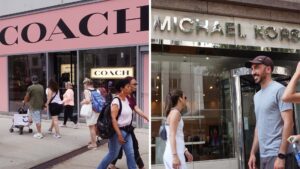Welcome to Extreme Investor Network, where we bring you the latest insights and analysis on business news that matter to investors. Today, we delve into the high-stakes antitrust trial between Tapestry and Capri, two powerhouse fashion companies looking to merge and create a bag behemoth.
In a courtroom in Manhattan, the Federal Trade Commission is seeking to block the $8.5 billion deal that would bring together six iconic fashion brands under one roof. Tapestry’s Coach, Kate Spade, and Stuart Weitzman would join forces with Capri’s Versace, Jimmy Choo, and Michael Kors. The outcome of this trial will have far-reaching implications for consumers, employees, and investors in the fashion industry.
The FTC argues that the merger would limit competition, leading to higher prices for consumers and reduced choices in the market. On the other hand, Tapestry and Capri maintain that the deal is necessary to stay competitive in an ever-evolving industry with changing consumer preferences.
Investors are closely watching the trial, as the decision could impact the stock prices of Tapestry and Capri. While Tapestry’s shares have been on the rise this year, Capri’s stock has experienced a decline. The key questions at the heart of the trial revolve around the competitive landscape in the handbag industry, the potential impact on consumers, and the rationale behind the merger.
One of the main arguments presented in court is the level of competition in the handbag market. Tapestry and Capri emphasize the fierce competition they face from a wide range of brands, from fast-fashion retailers to luxury names like Louis Vuitton. The FTC, however, contends that the merger would result in a lack of diversity in the market, leading to price increases and lower-quality products for consumers.
Economist Loren Smith, a key witness for the FTC, has raised concerns about the potential harm to consumers, predicting price hikes and reduced product quality if the merger goes through. Tapestry CEO Joanne Crevoiserat, on the other hand, sees the deal as an opportunity to reach a broader customer base and inject new life into Capri’s brands.
As the trial continues, the industry awaits the judge’s decision, which will shape the future of the fashion business. Stay tuned to Extreme Investor Network for the latest updates on this high-profile case and its implications for investors and consumers alike.

